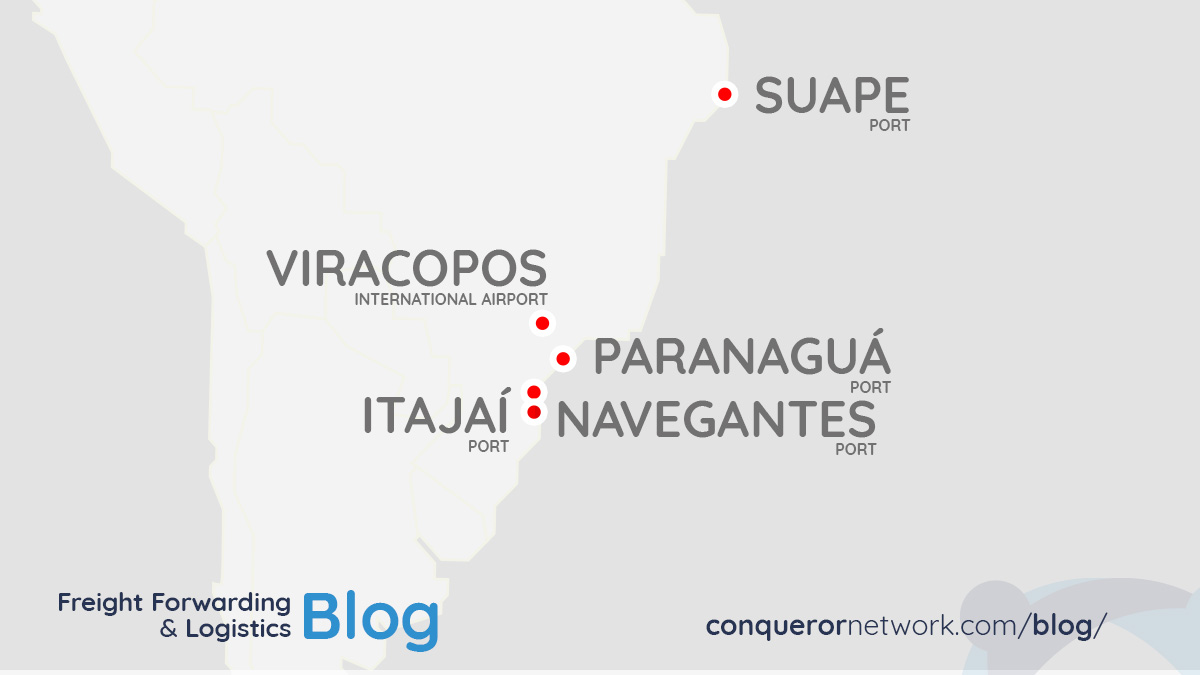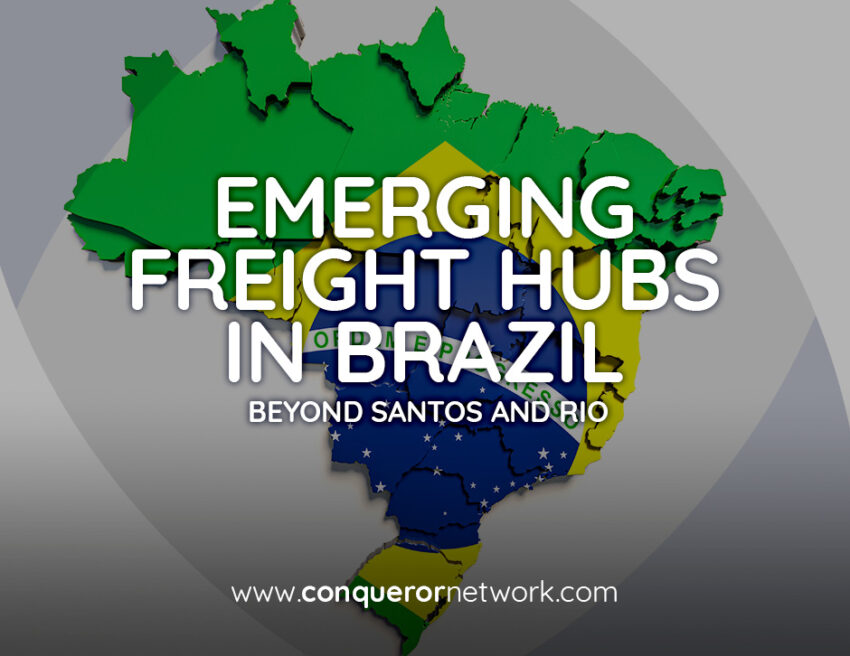For decades, the Port of Santos and the Port of Rio de Janeiro have dominated Brazil’s logistics landscape, serving as the primary gateways for the country’s booming export economy. However, a quiet revolution is taking place across Brazil’s logistics infrastructure. With modernization efforts, strategic investments, and regional development initiatives, a new generation of freight hubs in Brazil is emerging to complement and sometimes compete with the country’s historical giants.
Ports like Suape and Itajaí, and airports like Viracopos, are rapidly gaining ground as efficient, high-capacity logistics centers. These rising hubs offer exciting opportunities for freight forwarders, especially those seeking access to underserved territories or looking to bypass the congestion and high operating costs of legacy ports. Let’s explore these emerging hubs and how they’re changing the dynamics of freight forwarding in Brazil.
Suape Port- The Northeast’s rising star
Located in the state of Pernambuco, Porto de Suape is one of Brazil’s most promising logistics developments. What makes Suape stand out is its location: it’s the most modern port in Brazil’s northeast, strategically placed to serve both domestic coastal shipping and international deep-sea routes. Its proximity to African and European trade lanes also adds to its appeal.
Suape is a fully integrated port and industrial complex that benefits from a public-private management model, allowing faster infrastructure development and operational upgrades. Its design allows it to operate 24/7 with no tidal restrictions—a logistical advantage over many other ports in Brazil. In recent years, Suape has expanded its container handling capacity, improved intermodal access, and attracted multinational companies to its logistics and industrial zones. For freight forwarders seeking alternatives to the congested southeastern ports, Suape presents a well-connected, scalable, and cost-effective option.

Itajaí and Navegantes- Brazil’s Reefer Export Powerhouse
Located in the southern state of Santa Catarina, the twin ports of Itajaí and Navegantes have evolved into Brazil’s primary gateways for refrigerated cargo especially poultry, pork, and other perishable goods. These ports handle nearly 60% of the country’s frozen meat exports, making them indispensable to Brazil’s role as a global food supplier.
The region surrounding these ports is a hub for agribusiness and food processing, supported by a skilled workforce and advanced cold chain infrastructure. Recent upgrades at Itajaí and Navegantes include new cranes, expanded yard space, and digital tracking systems to support faster throughput and enhanced transparency.
As global demand for Brazilian food products continues to rise, the importance of these freight hubs in Brazil will only grow. Freight forwarders specializing in temperature-sensitive cargo or FMCG (fast-moving consumer goods) will find these ports well-equipped to handle complex logistics requirements while reducing transit time and spoilage risks.
Viracopos International Airport- Brazil’s air cargo innovator
While sea freight continues to dominate bulk logistics, Viracopos International Airport (VCP) in Campinas is revolutionizing air cargo services in Brazil. Located just 100 kilometers from São Paulo city, Viracopos has positioned itself as the country’s most modern air freight hub. The airport boasts Brazil’s largest and most automated cargo terminal, with systems capable of handling high volumes of express, pharmaceutical, and electronics cargo. What sets Viracopos apart is its focus on speed and efficiency, it offers the fastest customs clearance times in the country and specialized handling for high-value or sensitive goods.
For freight forwarders dealing with time-critical shipments, e-commerce fulfillment, or temperature-controlled pharmaceuticals, Viracopos presents a strategic alternative to Guarulhos Airport, which is often bogged down by congestion. This makes VCP a crucial part of the freight hubs in Brazil ecosystem, particularly for companies focused on speed and reliability.
Paranaguá Port- Quietly expanding its reach
Often overshadowed by its neighbor, Santos, the Port of Paranaguá in Paraná is quietly expanding its reputation as a bulk cargo and container shipping powerhouse. Its deep-water access, efficient rail connections, and steady government investment have helped transform it into a preferred choice for agricultural exports like soy and corn.
Paranaguá is also known for its commitment to environmental sustainability, making it an attractive hub for international brands with green supply chain mandates. Its growing reputation as a balanced, efficient, and forward-thinking port is drawing increasing interest from freight forwarders and shipping lines alike.
Why these emerging freight hubs in Brazil matter for freight forwarders
The rise of alternative freight hubs is a business opportunity for freight forwarders. As trade volumes grow and shippers demand more flexibility, freight hubs in Brazil like Suape, Itajaí, Viracopos, and Paranaguá offer relief from traditional chokepoints and introduce new corridors for trade. They also provide regional advantages, bringing logistics solutions closer to producers, reducing inland freight costs, and improving service levels. By operating near these emerging hubs, forwarders can develop niche services, specialize in certain cargo types, and win clients seeking agility and responsiveness. This decentralized logistics landscape makes local expertise more valuable than ever. Forwarders who know how to navigate Brazil’s regional hubs can offer customized, efficient solutions that multinational logistics giants often overlook.
How joining an international freight network can help freight forwarders in Brazil
As the freight forwarding industry becomes more interconnected, being part of a reliable global network is a game-changer, especially for forwarders operating in emerging territories like Brazil. Conqueror Freight Network, the largest exclusive freight forwarders network in the world, helps local forwarders level the playing field by offering access to vetted agents, reliable partners, and global coverage across 134+ countries.
For forwarders working out of freight hubs in Brazil, Conqueror offers immediate advantages:
-
Access to over 250 trusted partners worldwide in 134 countries who can help manage door-to-door operations seamlessly
- Territorial exclusivity means that members are the sole recipients of inward businesses to their territories from network partners
-
A fully digital quote generation tool, FreightViewer, to offer instant freight quotes to clients and compete with multinational freight companies
-
Promotion of the company through news and social media
-
Networking opportunities through Annual Meetings, where forwarders can establish long-term business partnerships face-to-face
By joining Conqueror, freight forwarders in Brazil can gain international credibility, grow their customer base, and enhance their service offerings, without the need for massive overheads or multiple foreign offices.
Looking ahead: Building business around Brazil’s next-gen hubs
As Brazil continues to invest in logistics infrastructure and improve trade connectivity, the country’s freight map is gradually shifting. New ports and airports are opening up untapped regions, supporting rural industries, and providing faster, cheaper, and more reliable options for global shippers. Freight forwarders who understand this shift and align their operations accordingly stand to benefit enormously. Whether it’s handling agribusiness exports from Paranaguá, reefer containers through Itajaí, or express cargo at Viracopos, the opportunity lies in specialization, responsiveness, and strategic partnerships.
For forwarders looking to scale, networks like Conqueror offer the tools, global reach, and credibility needed to make the most of Brazil’s evolving freight ecosystem.


